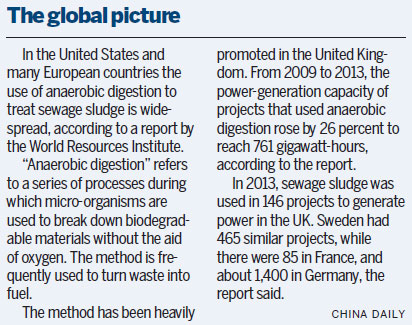Throwing money down the drain?
By Zheng Jinran (China Daily) Updated: 2015-12-10 07:59 After complex processing, sewage sludge can be made into compost suitable for use in public gardens, but there are no direct or smooth sales channels. Moreover, storage costs are prohibitively high, so few companies are willing to process the waste.
After complex processing, sewage sludge can be made into compost suitable for use in public gardens, but there are no direct or smooth sales channels. Moreover, storage costs are prohibitively high, so few companies are willing to process the waste.
"Although processing sludge to make it into a resource is a good way of dealing with it, no company will do it if they can't see any benefits," said Yang Xinhai, chief engineer at the Shanghai Environmental Sanitation Engineering Design Institute.
Shanghai has used compost made from processed sewage sludge in its public gardens, but the rank smell prompted complaints from residents, he said. Also, the potential pollution risks posed by the compost mean many garden management authorities are reluctant to use it.
"The cost of turning sludge into compost is around 250 yuan per ton, and if the company cannot sell it, it costs a lot to store, lowering the profit greatly," Yang said.
Chen, the minister of housing, accepted that the treatment of sewage sludge is problematic, but pledged that the ministry will help local governments to tackle the problem and ensure that by 2020, 90 percent of the nation's annual generation of sewage sludge will be rendered harmless.
Contact the writer at zhengjinran@chinadaily.com.cn
- Psychiatrist links smog, depression
- Weather a bonanza for taxi services
- Lawyer: Top court OKs death sentence in poisoning case
- Power for ministries to be clarified
- Red alert helps to reduce pollutants, say experts
- Elderly people snapping up dance products online
- Aging population could shrink workforce by 10% in China
- Severe smog brings mask panic buying
- Foreign economists advise on blueprint for next five years
- Online searches spike for masks, purifiers, condoms and sportswear







